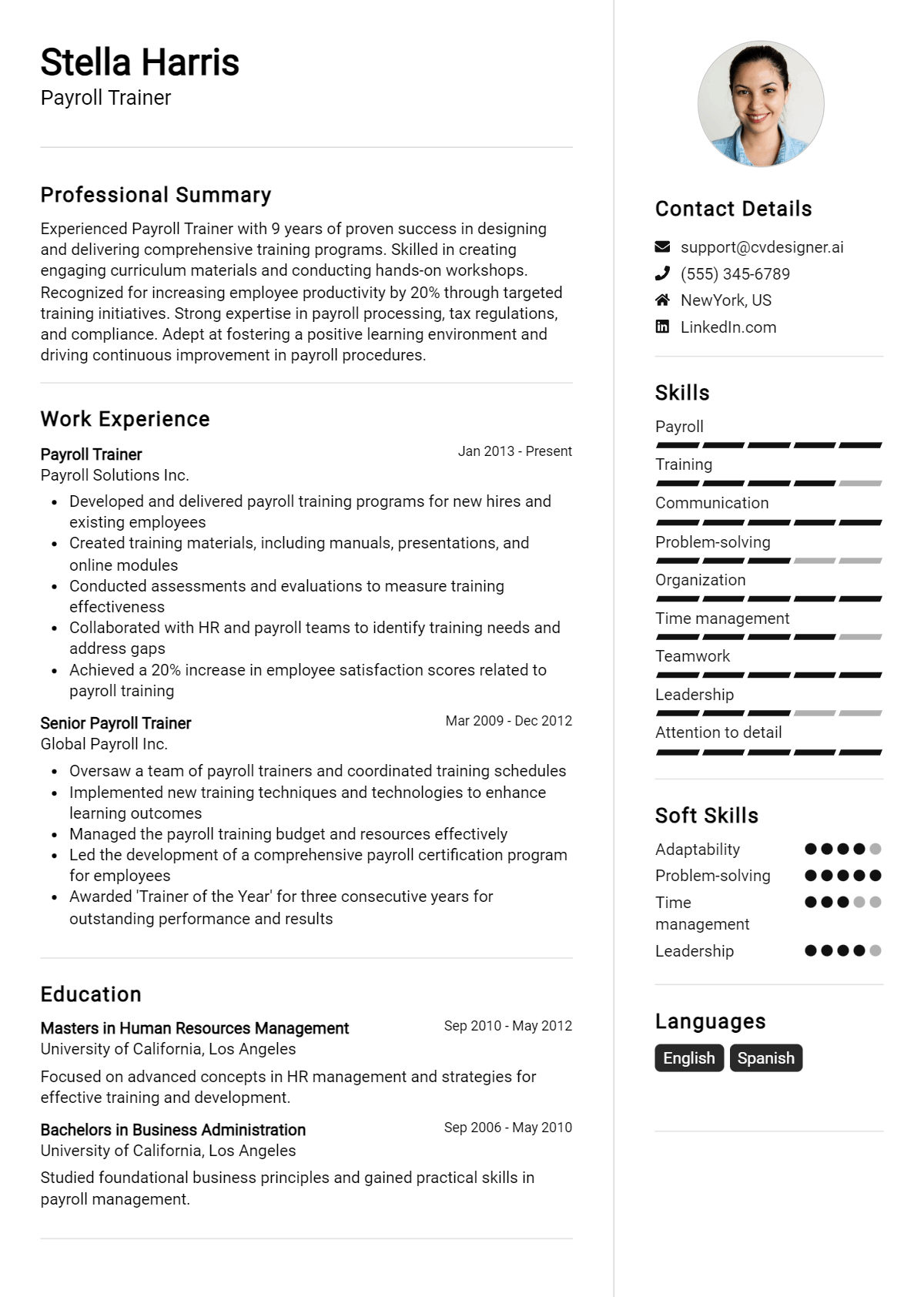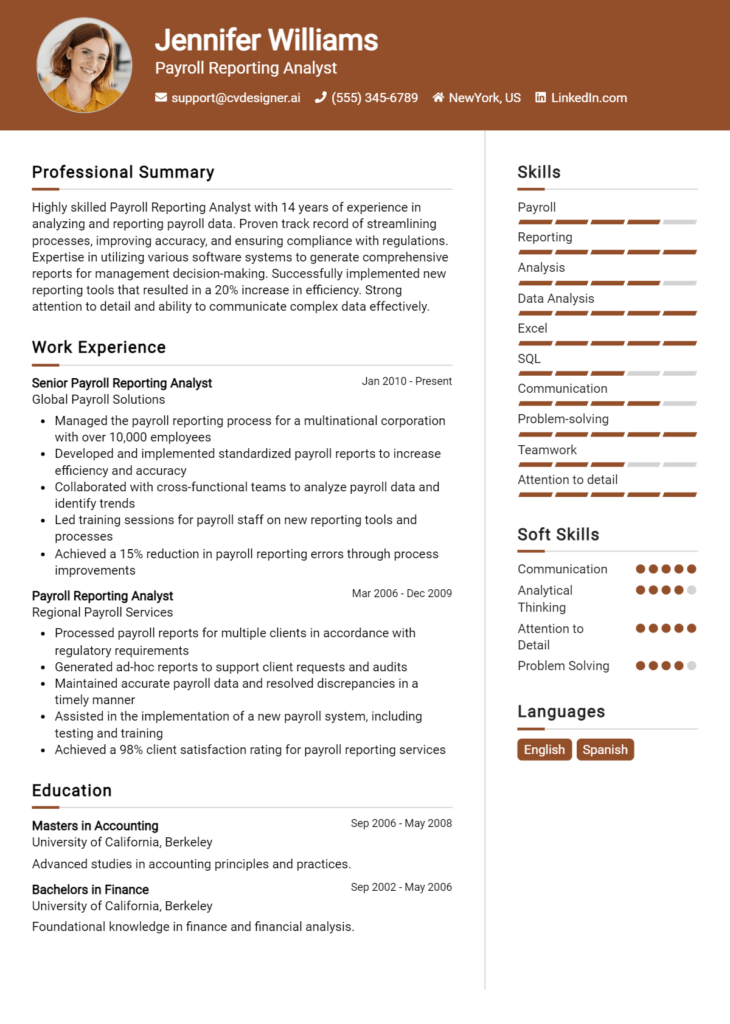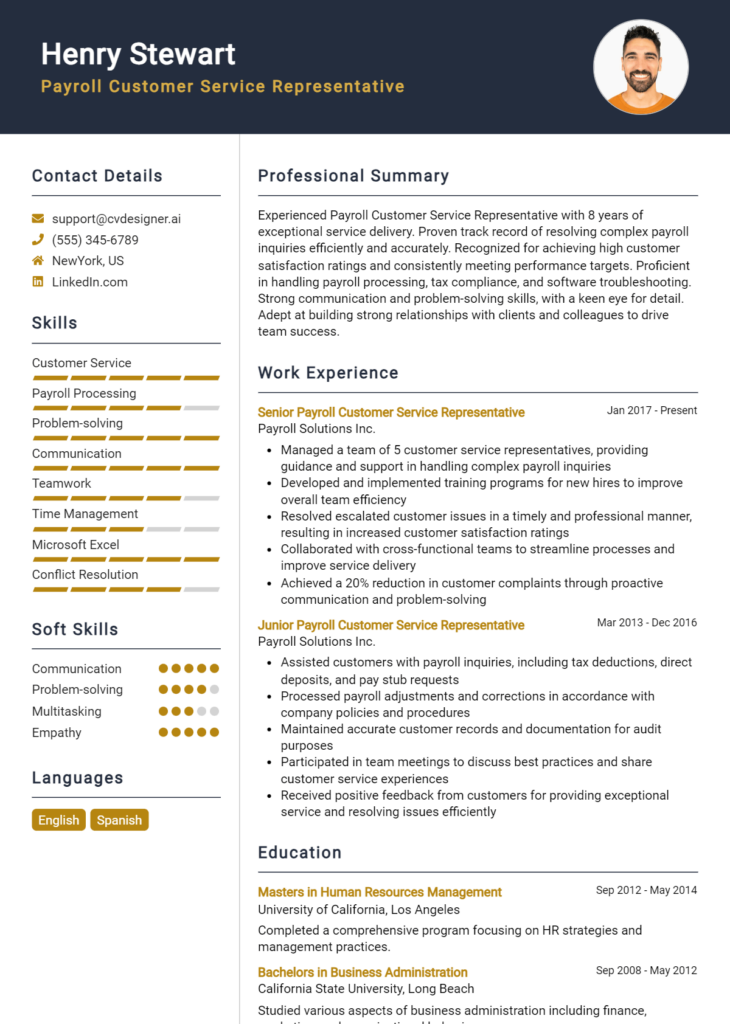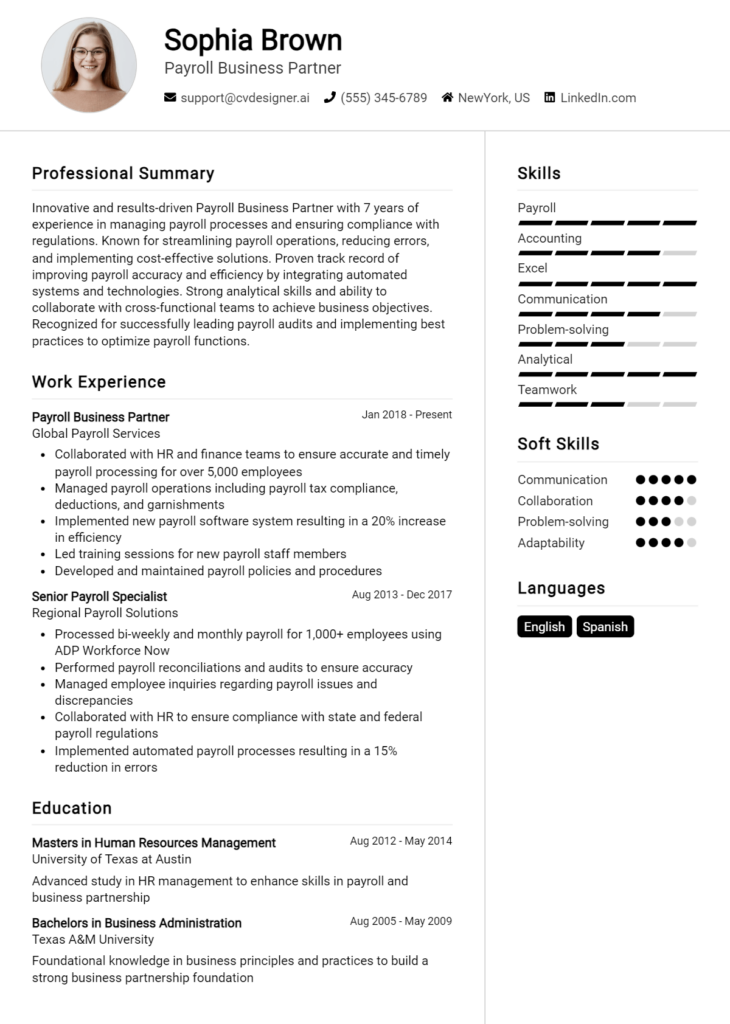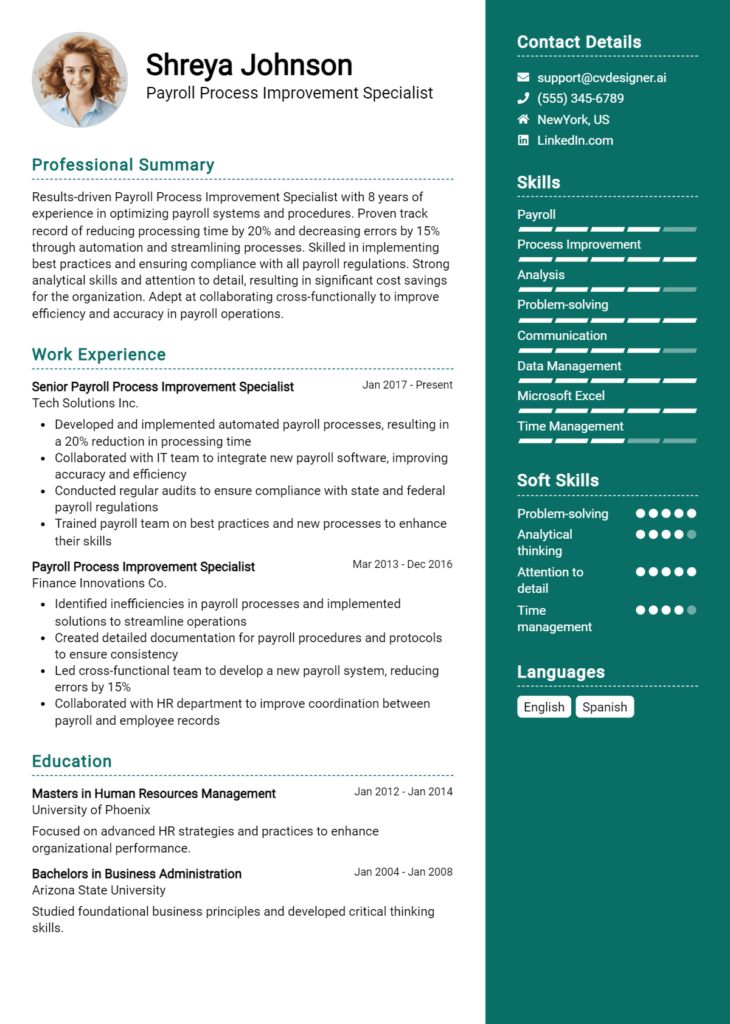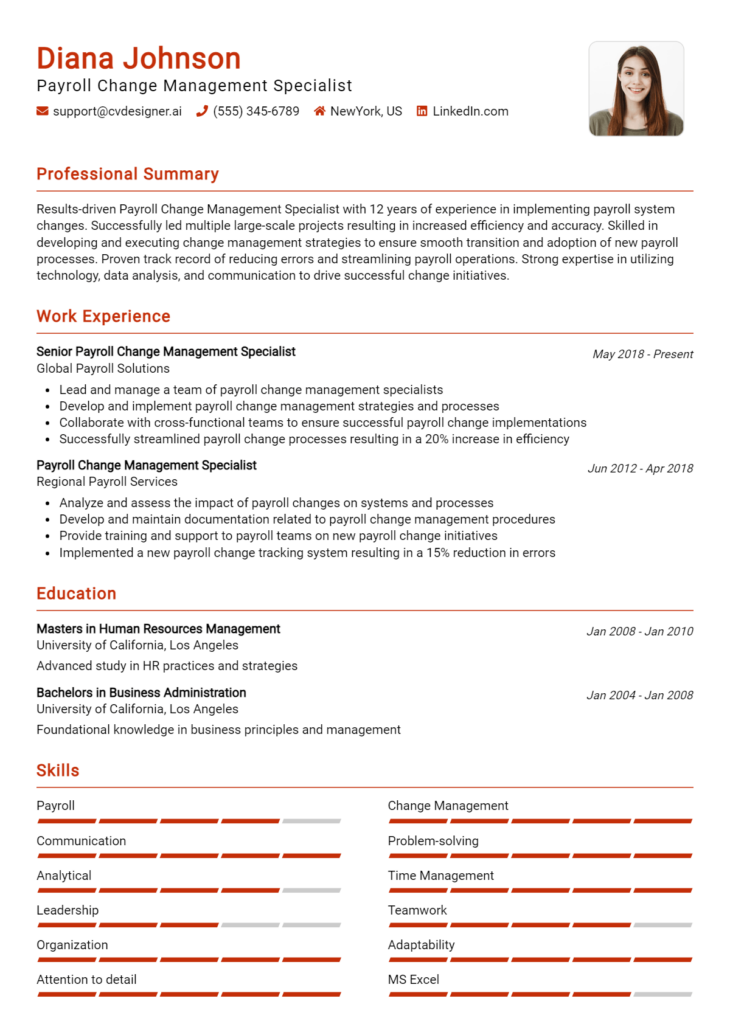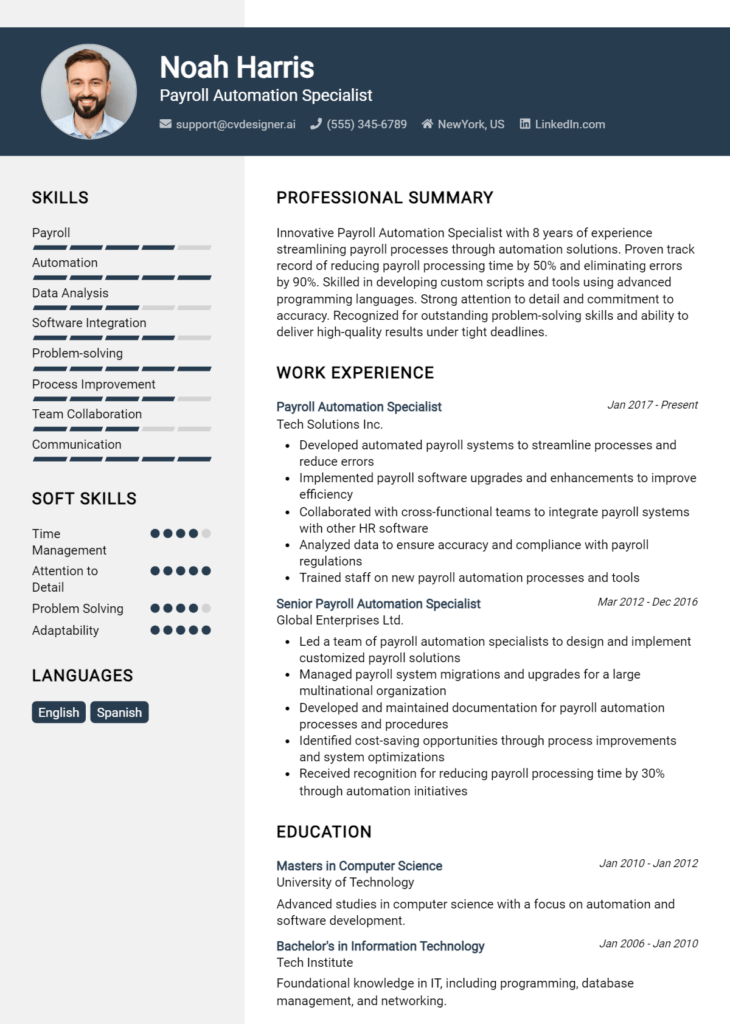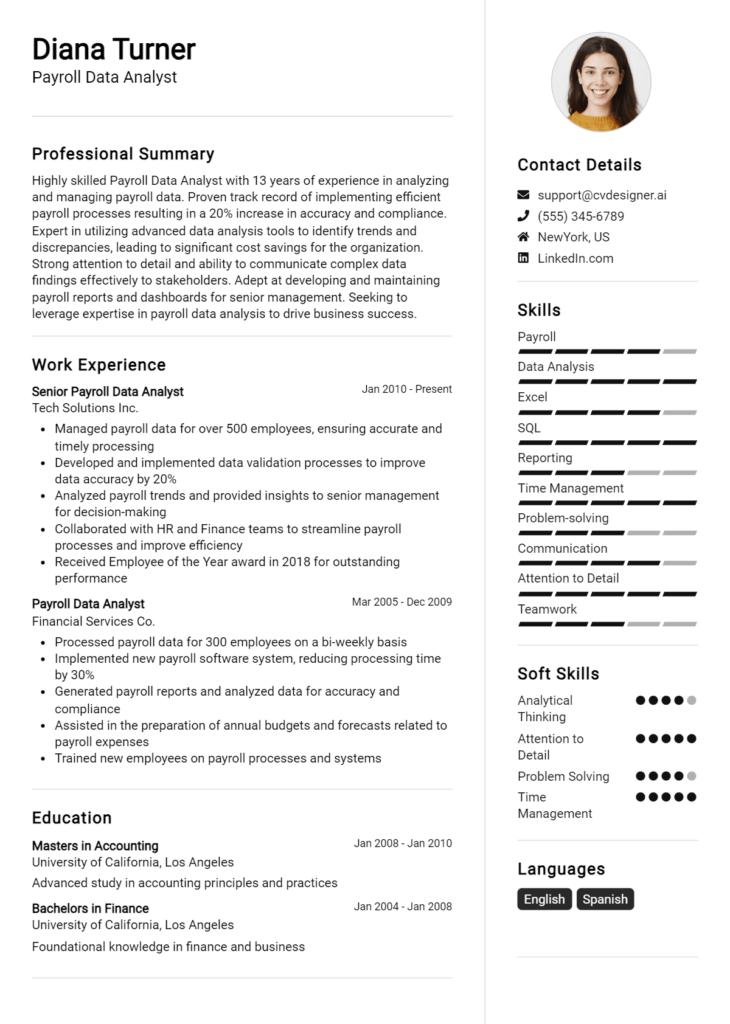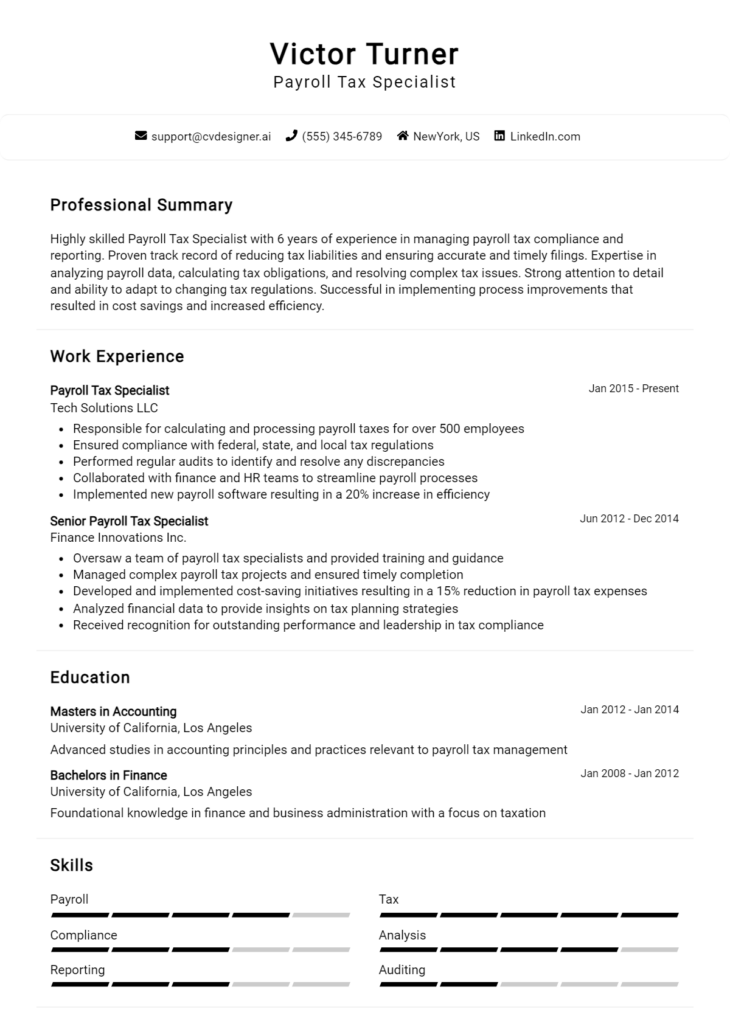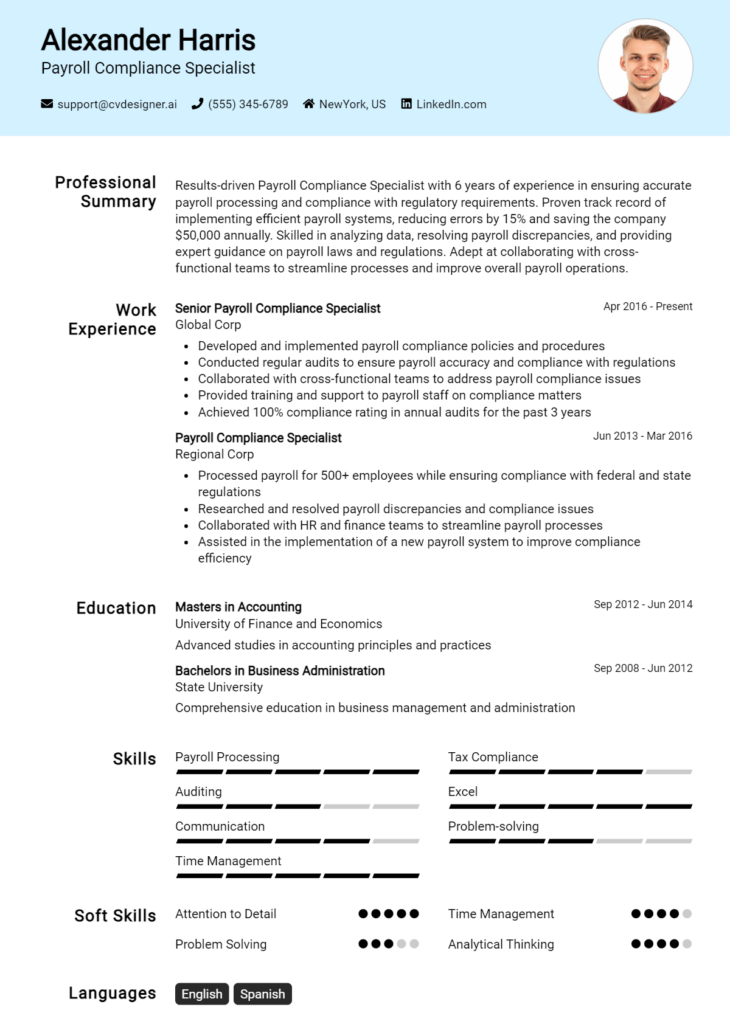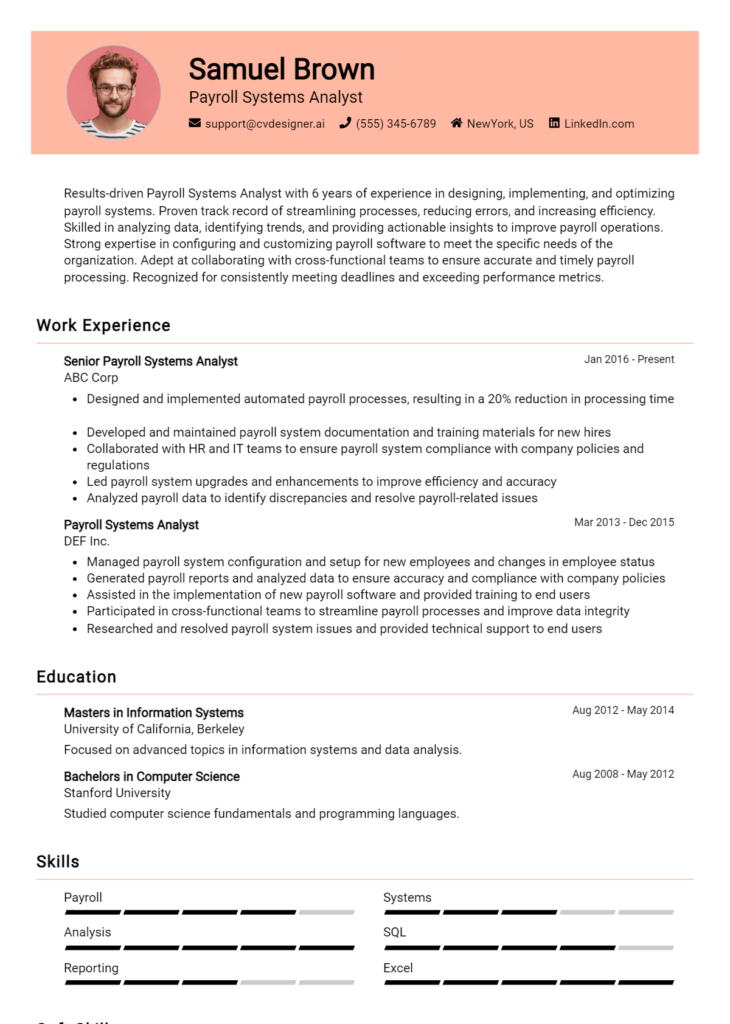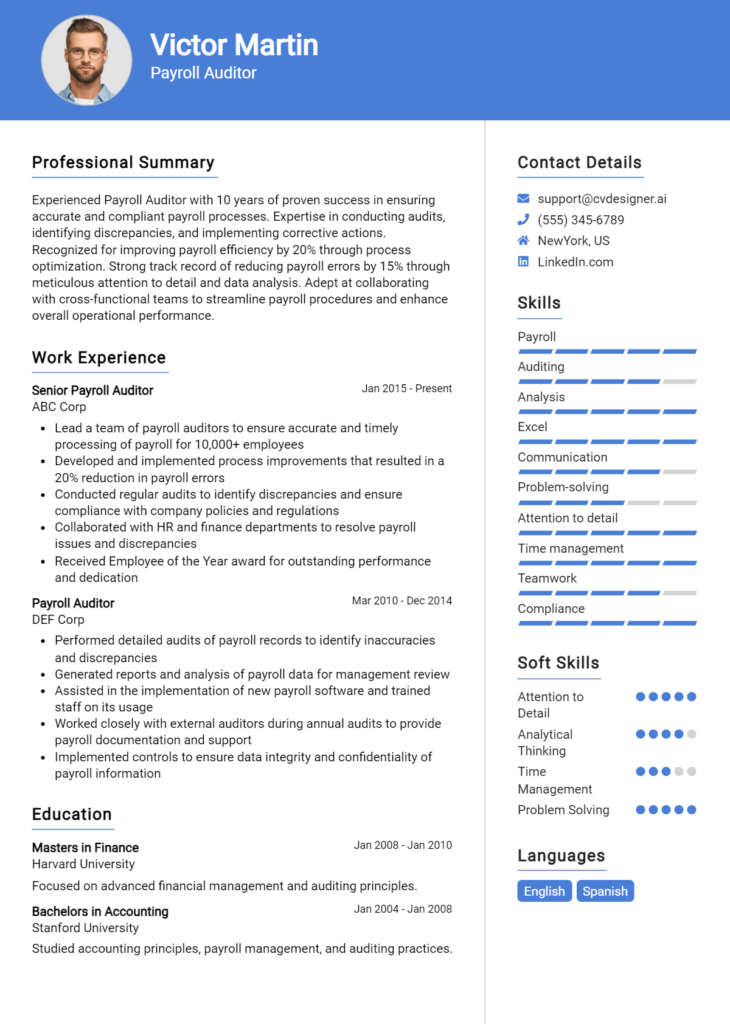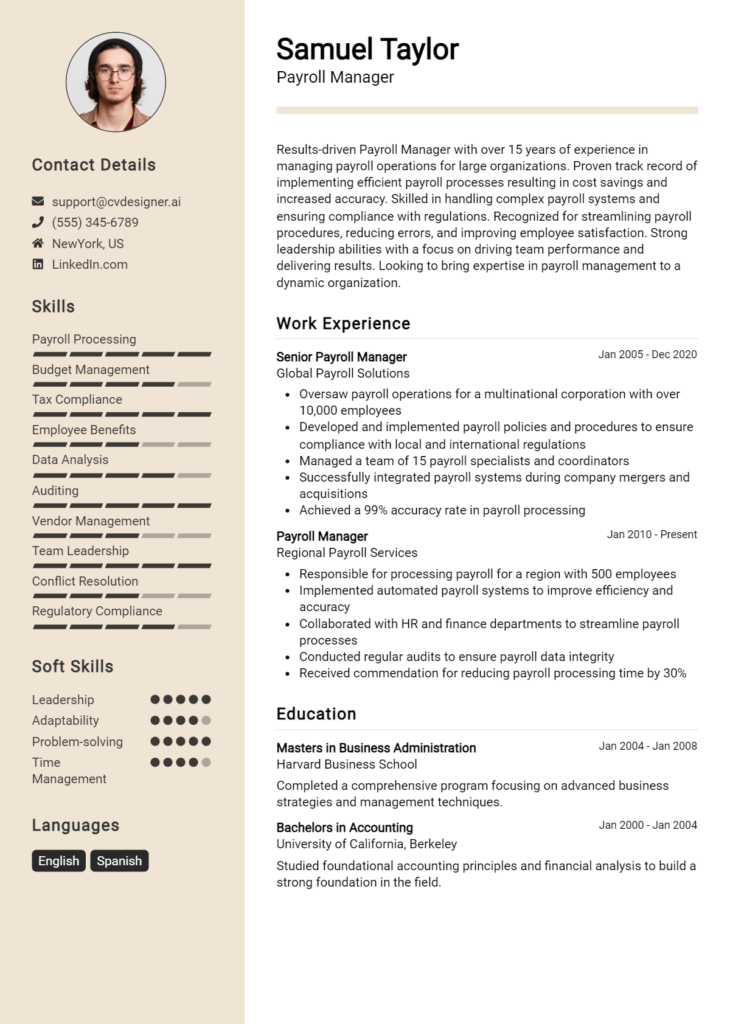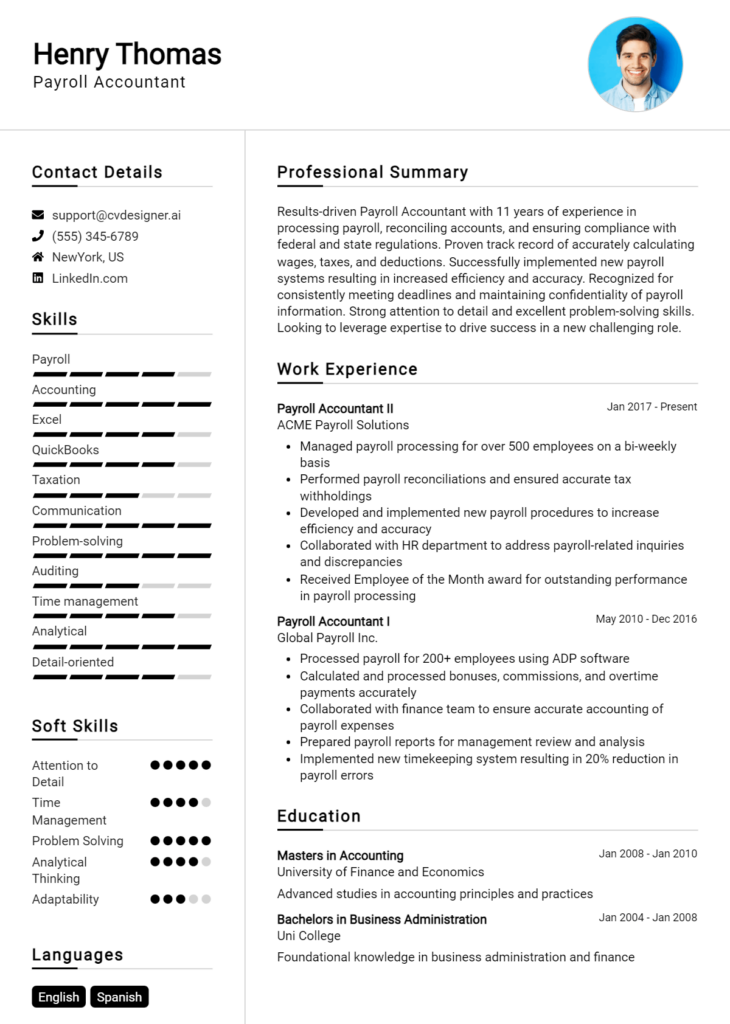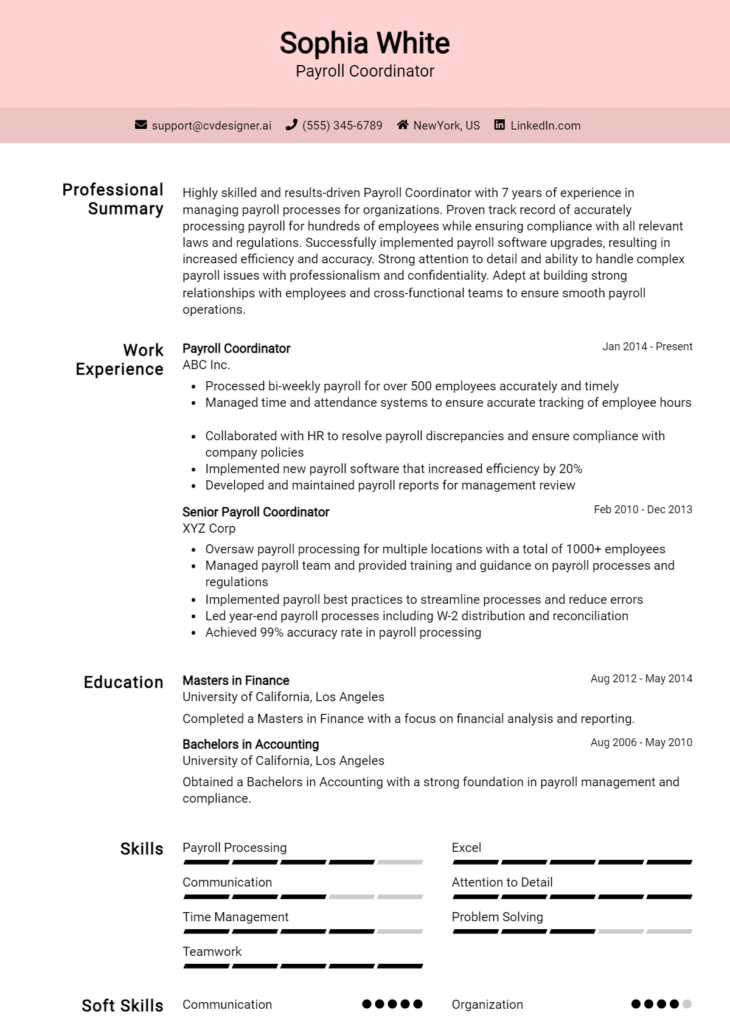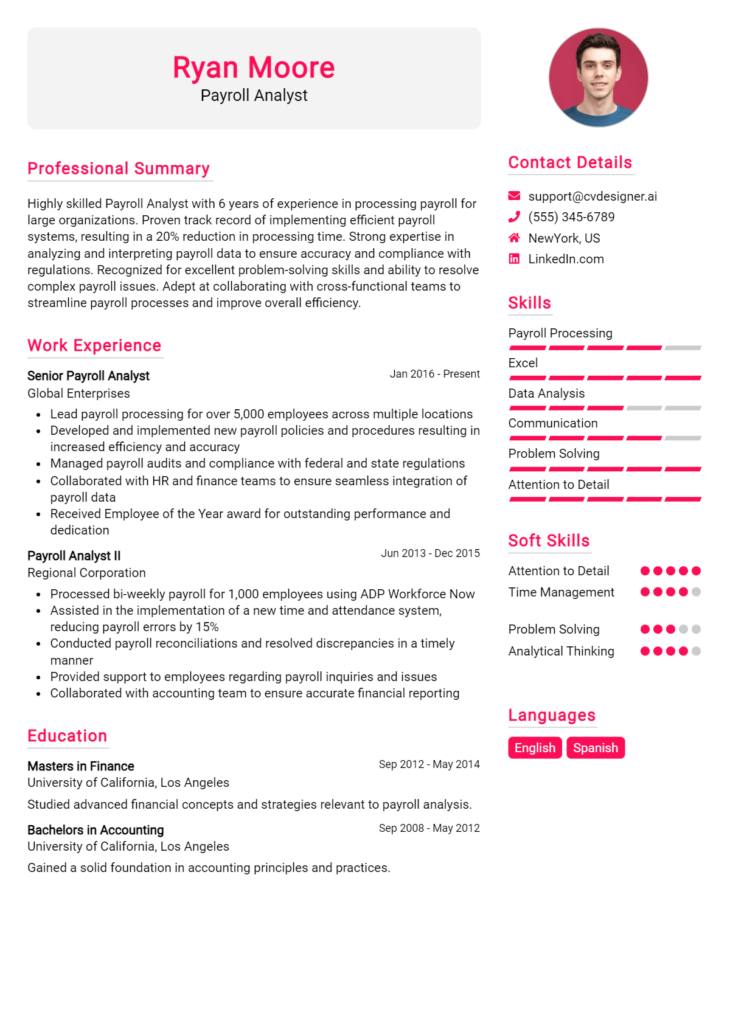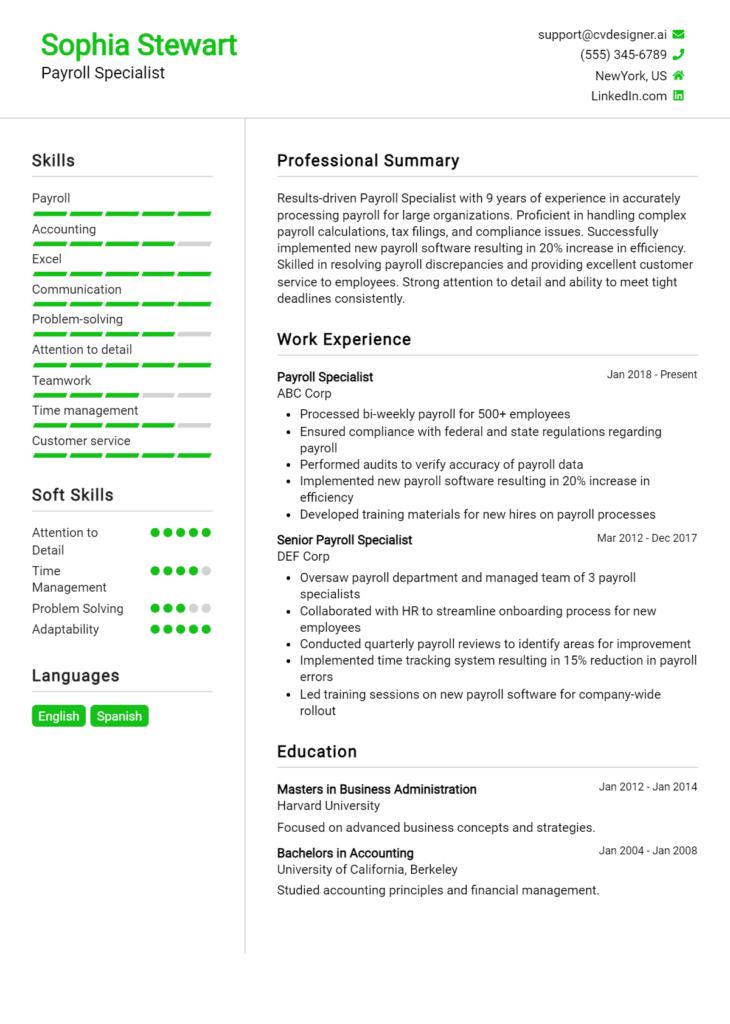Payroll Trainer Core Responsibilities
A Payroll Trainer plays a crucial role in bridging the gap between finance, HR, and compliance departments by imparting essential payroll knowledge and ensuring processes are followed accurately. Key responsibilities include developing training programs, conducting workshops, and providing ongoing support for payroll software. Strong technical, operational, and problem-solving skills are vital for addressing complex payroll issues and ensuring regulatory compliance. These competencies contribute significantly to organizational goals, highlighting the importance of a well-structured resume to showcase such qualifications effectively.
Common Responsibilities Listed on Payroll Trainer Resume
- Design and implement comprehensive payroll training programs.
- Conduct workshops and seminars for new and existing employees.
- Provide one-on-one coaching for payroll staff.
- Develop training materials and user manuals.
- Stay updated on payroll regulations and compliance issues.
- Evaluate training effectiveness and implement improvements.
- Collaborate with HR and finance teams to align payroll processes.
- Assist in troubleshooting payroll software issues.
- Monitor payroll processing and ensure accuracy.
- Respond to payroll inquiries and resolve discrepancies.
- Facilitate onboarding training for new payroll employees.
- Prepare reports on training outcomes and employee performance.
High-Level Resume Tips for Payroll Trainer Professionals
In the competitive field of Payroll Training, a well-crafted resume serves as your ticket to standing out among a sea of applicants. Often, it is the first impression you make on potential employers, and it must effectively showcase not only your skills but also your achievements in the payroll domain. A strong resume should reflect your expertise in payroll systems, compliance regulations, and training methodologies, clearly demonstrating how you can add value to an organization. This guide will provide practical and actionable resume tips specifically tailored for Payroll Trainer professionals, ensuring your resume captures the attention of hiring managers.
Top Resume Tips for Payroll Trainer Professionals
- Tailor your resume to match the specific job description by using relevant keywords and phrases that align with the role.
- Highlight your experience in payroll processing and compliance, showcasing your ability to manage complex payroll systems.
- Quantify your achievements by including metrics such as the percentage of payroll accuracy or the number of trainees successfully completed.
- Include industry-specific certifications, such as Certified Payroll Professional (CPP) or Fundamental Payroll Certification (FPC), to enhance your credibility.
- Showcase your training and mentoring experience, detailing the methods you used to improve employee understanding of payroll processes.
- Utilize a clean and professional format that is easy to read, ensuring that key information stands out.
- Incorporate a summary statement that succinctly outlines your professional background and career goals related to payroll training.
- List any relevant software proficiency, such as experience with payroll systems like ADP, Paychex, or QuickBooks.
- Provide examples of how you’ve improved payroll processes or training programs, demonstrating your impact on previous organizations.
By implementing these tips, you can significantly enhance your resume, thereby increasing your chances of landing a job in the Payroll Trainer field. A well-structured and tailored resume not only highlights your qualifications but also positions you as a strong candidate who understands the nuances of payroll training, making you more attractive to potential employers.
Why Resume Headlines & Titles are Important for Payroll Trainer
In the competitive landscape of payroll training, a well-crafted resume headline or title serves as a vital first impression for candidates. It is the first element hiring managers encounter, and a strong headline can instantly capture their attention while summarizing a candidate's key qualifications in a compelling way. A resume headline should be concise, relevant, and aligned with the specific job being applied for, allowing the applicant to stand out in a sea of resumes and convey their value proposition effectively.
Best Practices for Crafting Resume Headlines for Payroll Trainer
- Keep it short and impactful, ideally within 5-10 words.
- Tailor the headline to reflect the specific job title you are applying for.
- Highlight key skills or certifications relevant to payroll training.
- Use action-oriented language that conveys confidence and expertise.
- Incorporate industry-specific keywords to enhance visibility.
- Focus on unique achievements that differentiate you from other candidates.
- Avoid jargon or overly complex phrases that may confuse the reader.
- Ensure it aligns with the overall narrative of your resume.
Example Resume Headlines for Payroll Trainer
Strong Resume Headlines
Certified Payroll Trainer with 10+ Years in Compliance and Education
Expert Payroll Specialist and Trainer | Proven Track Record in Employee Development
Dynamic Payroll Trainer Focused on Transforming Processes and Enhancing Efficiency
Weak Resume Headlines
Payroll Experience
Trainer Looking for Opportunities
The strong headlines are effective because they immediately communicate the candidate's qualifications and unique value, using specific language that highlights their expertise and achievements. In contrast, the weak headlines fail to impress due to their vague nature and lack of specificity, leaving hiring managers with no clear understanding of the candidate's relevant skills or strengths. By crafting a strong, targeted headline, candidates can significantly increase their chances of catching the attention of hiring managers and securing an interview.
Writing an Exceptional Payroll Trainer Resume Summary
A well-crafted resume summary is crucial for a Payroll Trainer, as it serves as the first impression for hiring managers. This brief but powerful statement quickly highlights key skills, relevant experience, and notable accomplishments that align with the job role. A strong summary effectively captures attention, setting the tone for the rest of the resume, and must be concise, impactful, and tailored specifically to the position being applied for. By focusing on what makes the candidate stand out, a compelling summary can differentiate them from other applicants in a competitive job market.
Best Practices for Writing a Payroll Trainer Resume Summary
- Quantify Achievements: Use numbers to demonstrate your impact, such as the percentage of payroll accuracy or the number of employees trained.
- Focus on Skills: Highlight specific skills relevant to payroll training, such as software proficiency, regulatory knowledge, and communication skills.
- Tailor to Job Description: Customize the summary to reflect the language and requirements of the job listing.
- Keep it Concise: Aim for 2-4 sentences that convey your value succinctly.
- Showcase Relevant Experience: Mention years of experience in payroll training or related fields to establish credibility.
- Highlight Certifications: If applicable, include relevant certifications that enhance your qualifications.
- Use Action Verbs: Start sentences with dynamic verbs to create a sense of initiative and accomplishment.
- Reflect Professionalism: Use a confident tone and professional language to convey your seriousness about the role.
Example Payroll Trainer Resume Summaries
Strong Resume Summaries
Dynamic Payroll Trainer with over 8 years of experience enhancing payroll processes, achieving a 95% employee satisfaction rate through comprehensive training programs. Proven ability to reduce payroll discrepancies by 30% through meticulous attention to detail and effective software utilization.
Results-driven Payroll Trainer with a track record of successfully onboarding over 200 employees in payroll systems, leading to a 40% increase in payroll processing efficiency. Adept at creating engaging training materials that improve retention rates by 25%.
Experienced Payroll Trainer skilled in updating training modules to comply with evolving labor laws, resulting in a 50% decrease in compliance issues. Recognized for exceptional communication skills and the ability to foster a collaborative learning environment.
Weak Resume Summaries
Dedicated Payroll Trainer with experience in the industry. Looking for a new opportunity to share my knowledge and skills.
Payroll professional with training experience. I have worked in various roles and am interested in continuing my career in payroll training.
The strong resume summaries are considered effective because they include specific achievements, quantifiable outcomes, and relevant skills that directly relate to the Payroll Trainer role. They convey confidence and a clear understanding of the value the candidate brings. In contrast, the weak summaries lack detail and specificity, making them too generic and less impactful, failing to capture the attention of hiring managers.
Work Experience Section for Payroll Trainer Resume
The work experience section of a Payroll Trainer resume is vital as it provides a comprehensive overview of the candidate's practical knowledge and expertise in payroll management. This section serves as a platform to showcase technical skills, team management abilities, and the capacity to deliver high-quality payroll solutions. By quantifying achievements and aligning past experiences with industry standards, candidates can effectively demonstrate their value to potential employers, highlighting not just what they have done, but how well they have done it.
Best Practices for Payroll Trainer Work Experience
- Emphasize technical expertise in payroll systems and software used in previous roles.
- Quantify results achieved, such as percentage reductions in processing time or error rates.
- Highlight collaboration with cross-functional teams to enhance payroll accuracy and efficiency.
- Detail specific training programs developed and their impact on team performance.
- Showcase certifications or ongoing education that reinforces payroll knowledge.
- Use action verbs to convey leadership and initiative in previous positions.
- Align experiences with current industry standards and compliance requirements.
- Include feedback or accolades received from team members or management to support claims of success.
Example Work Experiences for Payroll Trainer
Strong Experiences
- Developed and implemented a training program that reduced payroll processing errors by 30%, enhancing overall accuracy and efficiency.
- Led a team of 10 payroll specialists, resulting in a 25% increase in productivity through improved workflow and training initiatives.
- Collaborated with HR and finance departments to streamline payroll operations, achieving a 15% decrease in processing time.
- Designed and delivered workshops that educated staff on compliance updates, leading to a 40% improvement in adherence to payroll regulations.
Weak Experiences
- Worked on payroll tasks as part of a team without specifying contributions.
- Assisted with training new employees in payroll without detailing the results.
- Handled payroll issues occasionally with no quantifiable outcomes shared.
- Participated in payroll processes with no mention of improvements or skills developed.
The examples provided illustrate the contrast between strong and weak experiences. Strong experiences are characterized by specific achievements, quantifiable results, and clear demonstrations of leadership and collaboration. In contrast, weak experiences lack detail, fail to highlight measurable impacts, and do not convey the candidate's unique contributions to previous roles, making them less compelling to potential employers.
Education and Certifications Section for Payroll Trainer Resume
The education and certifications section of a Payroll Trainer resume is crucial as it showcases the candidate's academic background and their commitment to professional growth through industry-specific certifications. This section not only provides potential employers with insights into the candidate's foundational knowledge of payroll processes, laws, and regulations but also emphasizes their continuous learning efforts in an ever-evolving industry. By detailing relevant coursework, certifications, and specialized training, candidates can enhance their credibility and demonstrate their alignment with the job role, thereby increasing their chances of securing an interview.
Best Practices for Payroll Trainer Education and Certifications
- Include only relevant degrees and certifications that directly relate to payroll training.
- List certifications from recognized industry organizations, such as the American Payroll Association (APA).
- Provide details of any specialized training programs or workshops attended.
- Highlight any advanced degrees that indicate a higher level of expertise.
- Be specific about coursework that is applicable to the role, such as classes on payroll systems or tax regulations.
- Keep the format clean and organized, making it easy for hiring managers to read.
- Update the section regularly to reflect new certifications or training completed.
- Use bullet points to ensure clarity and conciseness in presenting information.
Example Education and Certifications for Payroll Trainer
Strong Examples
- Bachelor of Science in Accounting, XYZ University, 2015
- Certified Payroll Professional (CPP), American Payroll Association, 2018
- Advanced Payroll Management Training, ABC Institute, 2020
- Coursework in Tax Compliance and Payroll Systems, XYZ University, 2014
Weak Examples
- Associate Degree in General Studies, ABC College, 2012
- Certification in Basic Computer Skills, 2010
- Outdated Payroll Specialist Certificate, DEF Organization, 2015
- No relevant coursework completed related to payroll or finance.
The strong examples are considered effective as they directly relate to the knowledge and skills required for a Payroll Trainer, showcasing relevant degrees, recognized certifications, and specific coursework that enhance the candidate's qualifications. In contrast, the weak examples lack relevance to the payroll field, featuring outdated or generic qualifications that do not demonstrate a commitment to the industry or the necessary expertise for the role.
Top Skills & Keywords for Payroll Trainer Resume
A well-crafted resume is vital for a Payroll Trainer, as it reflects not only professional experience but also the essential skills that make a candidate stand out in this specialized field. Skills are the backbone of a Payroll Trainer's effectiveness, enabling them to convey complex payroll processes and regulations clearly and concisely. They also play a critical role in fostering a productive learning environment, ensuring that trainees can grasp and apply intricate payroll concepts. Highlighting the right mix of soft and hard skills on your resume is key to demonstrating your capability in delivering high-quality training and support in payroll management.
Top Hard & Soft Skills for Payroll Trainer
Soft Skills
- Excellent communication skills
- Strong interpersonal abilities
- Patience and adaptability
- Effective presentation skills
- Ability to simplify complex information
- Strong organizational skills
- Active listening
- Empathy and rapport-building
- Time management
- Conflict resolution skills
Hard Skills
- Proficiency in payroll software (e.g., ADP, Paychex)
- Knowledge of federal and state payroll regulations
- Understanding of taxation and deductions
- Experience with payroll processing techniques
- Familiarity with HRIS systems
- Data analysis and reporting skills
- Knowledge of labor laws and compliance
- Ability to develop training materials and curricula
- Experience in instructional design
- Proficient in Microsoft Excel and other productivity tools
By emphasizing both your soft and hard skills in your resume, you create a comprehensive picture of your qualifications as a Payroll Trainer. Additionally, showcasing relevant work experience can further validate your expertise and readiness for the role.
Stand Out with a Winning Payroll Trainer Cover Letter
I am writing to express my interest in the Payroll Trainer position at your esteemed organization. With over five years of experience in payroll management and a proven track record in training and development, I am confident in my ability to effectively enhance your team’s payroll expertise and ensure compliance with the latest regulations. My background has equipped me with the skills necessary to not only handle payroll processing but also convey complex information in an engaging and understandable manner.
In my previous role at XYZ Corporation, I successfully developed and implemented a comprehensive training program that improved payroll accuracy and efficiency across multiple departments. I utilized a variety of training methods, including hands-on workshops, e-learning modules, and one-on-one coaching, tailored to meet the diverse learning styles of employees. As a result, our team saw a 30% reduction in payroll discrepancies within the first six months of the program. I am passionate about empowering individuals with knowledge and skills that foster both professional growth and organizational success.
I am particularly excited about the opportunity to work with your team because of your commitment to continuous improvement and employee development. I believe that a strong payroll department is crucial to the overall success of any organization, and I am eager to contribute my expertise in creating a culture of excellence in payroll practices. I am also well-versed in the latest payroll technologies and compliance regulations, ensuring that your team will stay ahead of the curve in a rapidly changing landscape.
Thank you for considering my application. I look forward to the possibility of discussing how my experience and vision align with the goals of your organization. I am enthusiastic about the opportunity to bring my skills as a Payroll Trainer to your team and contribute to a more efficient and knowledgeable payroll department.
Common Mistakes to Avoid in a Payroll Trainer Resume
When crafting a resume for a Payroll Trainer position, it's essential to present your qualifications and experiences effectively to stand out among other candidates. However, many applicants make common mistakes that can hinder their chances of landing an interview. By being aware of these pitfalls, you can create a compelling resume that highlights your expertise in payroll processes and training capabilities. Here are some common mistakes to avoid:
Vague Job Descriptions: Failing to provide specific details about previous roles can leave hiring managers unsure of your actual experience. Use quantifiable achievements to demonstrate your impact.
Ignoring Relevant Keywords: Many employers use applicant tracking systems (ATS) to filter resumes. Not including industry-specific keywords related to payroll and training can result in your resume being overlooked.
Lack of Customization: Submitting a generic resume fails to show your genuine interest in the specific Payroll Trainer position. Tailor your resume to match the job description, emphasizing relevant skills and experiences.
Overloading with Technical Jargon: While it's important to showcase your expertise, using too much industry jargon can make your resume difficult to read. Aim for clarity and balance technical terms with plain language.
Neglecting Soft Skills: Focusing solely on technical skills and neglecting soft skills like communication and leadership can be a missed opportunity. Highlight how your interpersonal skills enhance your training sessions.
Omitting Certifications and Training: As a Payroll Trainer, relevant certifications (such as CPP or FPC) can set you apart. Not including them may downplay your qualifications and expertise in payroll compliance.
Weak Summary Statement: A lackluster summary or objective statement can fail to grab attention. Craft a strong, concise summary that highlights your key qualifications and training philosophy.
Formatting Issues: A cluttered or inconsistent resume format can detract from your professionalism. Ensure that your resume is well-organized, easy to read, and visually appealing to create a positive impression.
Conclusion
As a Payroll Trainer, your role is crucial in equipping employees with the knowledge and skills necessary to manage payroll processes effectively. Throughout this article, we’ve discussed the essential responsibilities of a Payroll Trainer, including developing training materials, conducting workshops, and staying updated with payroll legislation. We’ve also highlighted the significance of effective communication and adaptability in this role to cater to diverse learning styles.
Now that you understand the key aspects of being a Payroll Trainer, it's time to ensure your resume reflects your expertise and qualifications. A polished resume is vital in standing out in the competitive job market. We encourage you to take a moment to review your Payroll Trainer resume and make necessary updates.
To assist you in this process, consider utilizing our resources, such as resume templates and resume builder. These tools can streamline the creation of your resume, ensuring it is both professional and visually appealing. Additionally, explore our resume examples for inspiration and cover letter templates to complement your application.
Take action now and elevate your career as a Payroll Trainer by enhancing your resume with these valuable resources!

